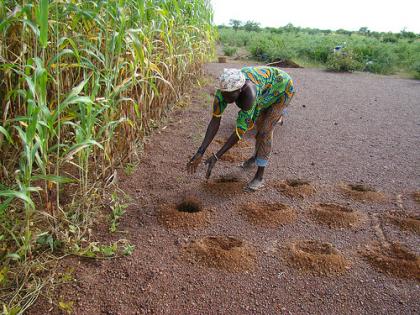by Cecilia Schubert
In a world where some countries will experience temperature peaks over 45-50°C, finding crops and vegetation that can deal with such heat stress will be a struggle. There may in fact be a limit to how much we’ll be able to adapt. But there are things we can do that make us armed enough to tackle the climate challenge. One of these things is looking at what climate smart agriculture can offer smallholder farmers.
If you have followed our blog, I am sure you have heard the term “climate smart agriculture” before. But what are these “climate smart practices”? What do they look like on the farm, and are they really working?
Perhaps it is time to get our minds off the theory and instead get into what is really happening on the ground. We've compiled 14 inspiring examples of large scale successes in climate smart agriculture, from all over the world. And at the recent UN Climate talks in Doha, we heard about a few more.
The presenters at the "Role of the UN in achieving climate smart agriculture" COP18 side event last week gave a rundown of some of the farming practices that can help create farmer resilience while improving food security and in some cases deliver mitigation co-benefits.
Water Management: little things can make a big difference
“Zai” is a traditional African planting technique that uses water and nutrients better, according to Alexandre Meybeck from the Food and Agriculture Organization (FAO). Semi-deep pits are dug in the field, normally before the rainy season with compost, or manure, covering the zai, to improve fertility. Seeds are then placed in the pits. The hole helps ensure that water does not run-off and nutrients stay put. The practice can help revitalize the soil in dry areas and has proven to improve yields. Preparing Zai holes in CCAFS West Africa site in Burkina Faso. Photo: M.Tall (CCAFS WA)
Preparing Zai holes in CCAFS West Africa site in Burkina Faso. Photo: M.Tall (CCAFS WA)
In Burkina Faso, the CCAFS West Africa regional team is engaging with farmers and farmers’ organisations to help them change practices towards techniques such as zai, that help farmers deal with the staggeringly hot and dry farming conditions. See photos from this work: Burkina Faso farmers show off their zai knowledge.
In a world where some countries will experience temperature peaks over 45-50°C, finding crops and vegetation that can deal with such heat stress will be a struggle. There may in fact be a limit to how much we’ll be able to adapt. But there are things we can do that make us armed enough to tackle the climate challenge. One of these things is looking at what climate smart agriculture can offer smallholder farmers.
If you have followed our blog, I am sure you have heard the term “climate smart agriculture” before. But what are these “climate smart practices”? What do they look like on the farm, and are they really working?
Perhaps it is time to get our minds off the theory and instead get into what is really happening on the ground. We've compiled 14 inspiring examples of large scale successes in climate smart agriculture, from all over the world. And at the recent UN Climate talks in Doha, we heard about a few more.
The presenters at the "Role of the UN in achieving climate smart agriculture" COP18 side event last week gave a rundown of some of the farming practices that can help create farmer resilience while improving food security and in some cases deliver mitigation co-benefits.
Water Management: little things can make a big difference
“Zai” is a traditional African planting technique that uses water and nutrients better, according to Alexandre Meybeck from the Food and Agriculture Organization (FAO). Semi-deep pits are dug in the field, normally before the rainy season with compost, or manure, covering the zai, to improve fertility. Seeds are then placed in the pits. The hole helps ensure that water does not run-off and nutrients stay put. The practice can help revitalize the soil in dry areas and has proven to improve yields.
 Preparing Zai holes in CCAFS West Africa site in Burkina Faso. Photo: M.Tall (CCAFS WA)
Preparing Zai holes in CCAFS West Africa site in Burkina Faso. Photo: M.Tall (CCAFS WA)In Burkina Faso, the CCAFS West Africa regional team is engaging with farmers and farmers’ organisations to help them change practices towards techniques such as zai, that help farmers deal with the staggeringly hot and dry farming conditions. See photos from this work: Burkina Faso farmers show off their zai knowledge.
Original Article Here

No comments:
Post a Comment